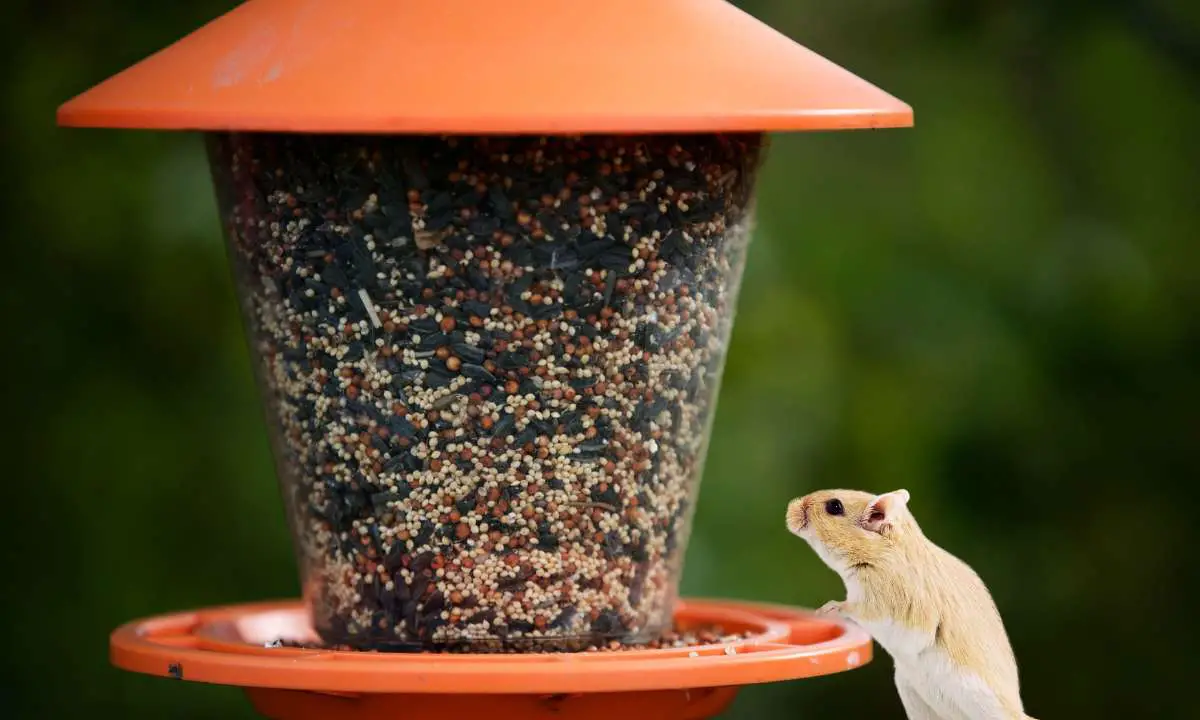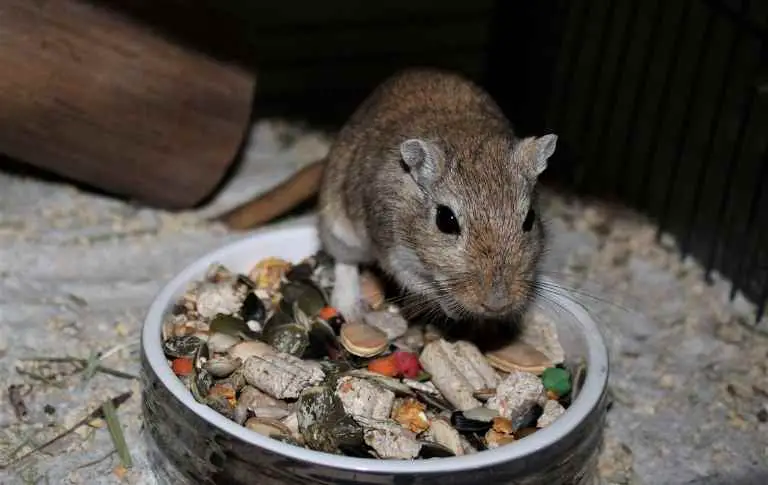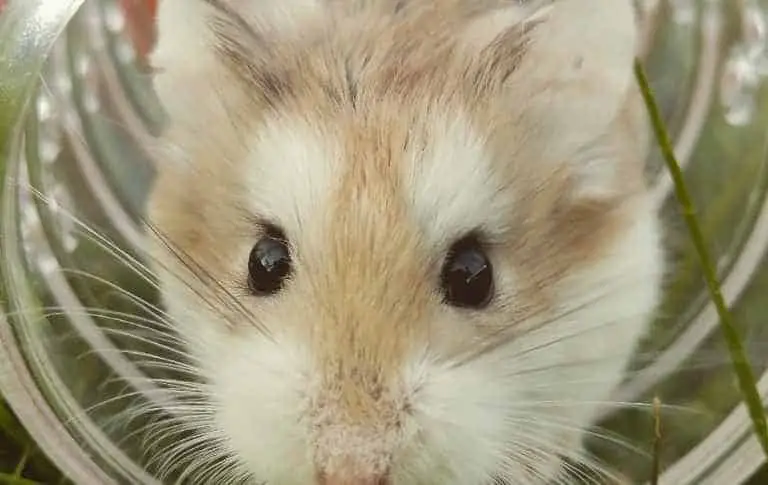Can you feed your gerbils bird food? Sure, you can. But should you? Well, that’s where our story takes a feathery twist. Uncover the secret diet of these tiny nibblers, and why your gerbils might thank you for not sharing Polly’s crackers!
Table of Contents
Understanding Gerbil Diet
Gerbils, popular pets known for their small size and lively nature, have specific dietary requirements that pet owners need to understand in order to ensure their health and well-being. Being omnivores, gerbils can eat a mixture of plant-based and meat-based food. In their natural habitat, gerbils feast on a diverse range of seeds, plants, and insects, providing them with a balanced diet rich in protein, fiber, essential nutrients, and minerals.
In captivity, it is essential to replicate their natural diet as closely as possible. Commercial food mixes, specially formulated for gerbils, are readily available. These are designed to offer the minerals they need, including seeds, beans, grains, dried vegetables, and fiber. This commercial food mix becomes the core of the diet for your gerbil.
While commercial pellet mixes are the mainstay of their diet, gerbils also need a variety of other foods for their nutritional needs. For instance, it’s fine for gerbils to eat bird seeds, but only in moderation, since they are high in fat and carbohydrates. Sesame seeds found in many birdseed mixes can provide a healthy calcium boost, especially important for maintaining strong bones and healthy teeth in gerbils. Be aware, however, that not all bird seeds are created equal. Some seeds and nuts are more nutritionally dense than others, and it’s recommended to pick out the foods that aren’t suitable for gerbils from a standard birdseed mix.
Furthermore, gerbils also need fresh vegetables and fruits, which can be given as occasional treats. You can feed your pet with a mix of seeds, cornflakes, dried vegetables, and even unsalted nuts. However, avoid giving too many treats as they can cause obesity in gerbils and lead to other health complications.
Aside from their nutritional needs, the food you’re feeding your pet gerbil also plays a role in their dental health. Gerbils have teeth that continuously grow, so they need to gnaw on hard foods like nuts and seeds to keep their teeth filed down. Some components of bird feed, like sunflower seeds and cracked corn, are good for gerbils as they provide an opportunity to wear down their teeth.
In conclusion, to feed gerbils properly, it’s best to provide a balanced diet that mimics their natural food intake. This includes a commercial food mix, a moderate amount of bird seeds, and occasional treats of fresh vegetables and fruits. Always ensure the food is safe to feed to your gerbil to avoid any health complications. If in doubt, consult with your veterinarian to determine the best food options for your pet. Your gerbil’s diet is essential to their health, so take the time to understand what they need and enjoy the rewarding experience of caring for these small, delightful creatures.

Can Gerbils Eat Bird Food?
Gerbils can eat some types of bird food, though it’s important to understand that not all bird food is suitable or nutritionally balanced for them. The main concern is that gerbils require a complex diet rich in nutrients, vitamins, and minerals, including a balanced mixture of carbohydrates, fat, and protein. Bird pellets, for instance, are not suitable as they are too high in fat and can lead to malnourishment in gerbils. However, birdseed can be given in moderation and with careful selection of the components
Bird Food That is Safe for Gerbils
In a birdseed mix, certain seeds and nuts are more nutritionally dense and safe for gerbils. Some of the safe foods from birdseed mixes include:
- Sunflower Seeds: They are high in fat and low in calcium but are an excellent source of essential fat and protein. Gerbils love them, but they should be given in moderation to prevent excessive fat intake
- Pumpkin Seeds: These seeds are less fatty and high in fiber, which aids digestion. They also contain good levels of carbohydrates and protein, as well as magnesium, iron, and calcium. The outer shell of the seeds is fibrous and solid, which allows gerbils to wear down their teeth
- Wheat: Grains like wheat are safe for gerbils and provide a good source of carbohydrates, offering energy for them to burrow and exercise
- Dried Fruit: Gerbils can enjoy dried fruits, but these should be given sparingly as they are high in sugar and can lead to weight gain if overconsumed
- Cracked Corn: This is often found in bird mixes and provides a good texture for keeping gerbils’ teeth filed down. Gerbils enjoy both eating and playing with cracked corn
- Calcium-Fortified Seeds: Some bird seeds are fortified with extra calcium, which is essential for gerbils’ strong bones and healthy teeth. This can be a good substitute if you’ve run out of regular gerbil food, but it shouldn’t be relied upon as the sole source of calcium
Bird Food That is Not Safe for Gerbils
Bird pellets are not suitable for gerbils. They are made with mealworms, suet, flours, and artificial flavorings, resulting in a diet that is too high in fat and can lead to malnourishment in gerbils
The Nutritional Content of Bird Food and Its Impact on Gerbils
Bird food can provide some nutritional benefits for gerbils, but it’s crucial to be aware of the differences between bird food and the optimal diet for a gerbil.
Gerbils’ typical diet includes seeds, beans, grains, dried vegetables, and fiber, and they can also eat fruits and vegetables as occasional treats. On the other hand, birdseed mixes are usually high in fat and carbohydrates, and while not toxic to gerbils, they can lead to nutritional imbalances if used as a primary food source
Nutritional content in bird food that is beneficial for gerbils includes calcium (found in some fortified seeds) for strong bones and teeth, and fibrous seeds and nuts, which provide a mechanism for gerbils to file down their constantly growing teeth. Seeds and nuts can also serve as a tasty treat, providing some variety in the gerbil’s diet and offering extra enjoyment.
The Pros and Cons of Feeding Bird Food to Gerbils
Benefits of feeding bird food to gerbils
- Diversity of Nutrients: Bird food can provide a variety of nutrients that can complement a gerbil’s diet. Some bird seeds are fortified with calcium, which is necessary for strong bones and healthy teeth in gerbils1. Sunflower seeds, common in bird food, are high in essential fat and protein. Pumpkin seeds, another component, are high in fiber and contain important nutrients like magnesium, iron, and calcium. Wheat, also often found in bird food, is a good source of carbohydrates, providing energy for gerbils.
- Tasty Treat: Bird food can serve as a tasty treat for gerbils and can add variety to their diet. Gerbils can get bored of eating the same foods every day, and adding seeds and nuts from bird food can add some flavor and enjoyment to their meals.
- Dental Health: Bird food can help keep gerbils’ teeth filed down. Gerbils have teeth that continuously grow and they need to keep them filed down to prevent tooth overgrowth. Bird food contains nuts and seeds that make it possible for gerbils to do this.
Potential risks and drawbacks
- Imbalanced Diet: While bird food can be a good supplement, it is not designed to meet all the nutritional needs of a gerbil. Bird pellets are often too high in fat and can result in malnourishment for gerbils. Gerbils require a complex diet that’s rich in nutrients, vitamins, and minerals including a mixture of carbohydrates, fat, and protein to stay healthy. Commercial gerbil food is designed to meet these needs and includes seeds, beans, grains, dried vegetables, and fiber.
- Selective Eating and Nutrient Excess: Gerbils might selectively eat only their favorite parts of bird food, which could lead to an imbalanced diet. For instance, gerbils love sunflower seeds and will often pick them out first, ignoring other seeds and nuts within the mix until that’s all that’s left. This could potentially cause health issues due to the high oil content of sunflower seeds. Similarly, dried fruit found in bird mixes can be high in sugar, and too much can cause weight gain in gerbils.
- Inadequate Nutrients in Some Bird Foods: Not all bird seed mixes are created equal. Certain types of seeds, nuts, and other foods may not be as appropriate for gerbils due to their nutritional content. Although none of these foods are considered harmful or toxic to gerbils, some may be more nutritionally beneficial than others.
In conclusion, while bird food can be used as a supplementary food source for gerbils, it should not be relied on as the primary diet. It’s important to ensure that gerbils have a balanced diet that provides all the necessary nutrients they need to stay healthy. Always consult with a vet or a gerbil care expert before making significant changes to your pet’s diet.
Alternatives to Bird Food for Gerbils
The recommended diet for gerbils
Gerbils need a balanced and nutrient-rich diet that includes a mix of carbohydrates, fats, and proteins. In captivity, gerbils commonly eat commercial food which provides essential minerals and fiber. Their diet should include a variety of seeds, beans, grains, dried vegetables, and fiber. Gerbil pellets are also a good option as they are easy for gerbils to chew and digest.
Apart from their regular diet, gerbils can also enjoy fruits and vegetables as occasional treats. These include pears, melons, apples, oranges, cucumber, fennel, pumpkin, and carrot. However, these should only be given in moderation as they can cause weight gain if consumed in large amounts3.
Seeds and nuts can also be given as treats. Gerbils love sunflower seeds, which are high in essential fats and proteins but should be given in moderation due to their high oil content. Pumpkin seeds are another good option as they are less fatty than other seeds, high in fiber, and contain good levels of carbohydrates and protein, along with nutrients like magnesium, iron, and calcium.
Gerbils can eat dried fruits, but they should be given in moderation as they are high in sugar and can lead to weight gain. Dried fruits are more flavorful than dry food and can satisfy a gerbil’s desire for variety in their diet.
Lastly, cracked corn, which is commonly found in bird mixes, is safe for gerbils to eat. Gerbils love eating and playing with it, and it provides an excellent texture for keeping their teeth filed down.
Bird food can be given to gerbils as a treat, as it contains items like seeds and nuts that gerbils enjoy. However, it’s important to monitor the types of seeds and nuts in the mix, as some are more nutritionally dense than others. Also, bird food should not be relied upon as the primary source of nutrients for your gerbil.
In summary, while bird food can be given to gerbils in moderation, it’s best to stick to a diet consisting of commercial gerbil food, occasional fruits and vegetables, and carefully chosen seeds and nuts. It’s always important to maintain a balance and not overfeed your gerbil with treats to ensure they stay healthy and happy.
Feeding Interval and Quantity
Understanding the feeding patterns of gerbils is crucial for maintaining their health and well-being. As a pet owner, you should aim to feed your gerbils once daily, ideally at the same time each day. Establishing a consistent feeding schedule helps to mirror the natural eating habits of these small, popular rodents.
Although gerbils can eat bird food, it’s important to remember that not all bird food is beneficial or even safe for gerbils. Bird food should not be the primary source of nutrition for your gerbil, but certain types such as millet or canary seed can be offered in moderation. When you decide to feed your pet this type of food, only a small quantity (a pinch or two) should be mixed into their regular, nutritious gerbil food mix. This ensures that the bird food doesn’t take over as the main component of their diet.
Remember, it’s essential to monitor your gerbil’s weight and overall health when introducing new foods into their diet, like bird seeds. By doing so, you can identify and prevent any potential health complications that might arise from dietary imbalances. Ensuring your gerbil is consuming a nutritious, balanced diet is a key aspect of responsible pet ownership.
Unsafe Foods for Gerbils
While there is a wide variety of foods that gerbils can enjoy, there are also some foods that should be avoided in their diet.
High-sugar fruits such as grapes, bananas, and oranges should not be given to gerbils as they can cause health problems such as obesity and diabetes. Additionally, dairy products like cheese and yogurt should be avoided since gerbils are lactose intolerant.
Nuts and seeds should also be limited in a gerbil’s diet since they contain high levels of fat which can lead to obesity. Foods with high salt content such as chips or pretzels should also be avoided as too much salt can lead to dehydration.
Finally, raw potatoes and onions are toxic to gerbils so these should never be fed to them. It is important to remember that any human food given to a gerbil should only be given in small amounts as treats. A balanced diet of commercial pellet mixes supplemented with fresh vegetables and occasional treats is the best way to ensure your gerbil stays healthy and happy!
Gerbil Health and Nutrition
Maintaining the health and nutrition of your gerbil is a crucial part of pet ownership. To ensure that your gerbil remains vibrant and joyful, it’s vital to provide them with a balanced diet that meets all their nutritional requirements. Recognizing the signs of a healthy gerbil and understanding the symptoms of malnutrition can equip you with the knowledge necessary to ensure your pet receives the nutrition they need.
A robust gerbil will exhibit bright eyes, a glossy coat, and an abundance of energy. These small, popular pets should be active, show curiosity about their surroundings, and possess a willingness to explore. A healthy gerbil will also demonstrate a good appetite and interest in the food you provide.
In terms of what gerbils eat, they require a balanced diet that includes protein, fiber, vitamins, and minerals. Commercial pellet mixes are formulated to provide your gerbils with all the essential nutrients they need. Moreover, gerbils can eat bird seed, such as millet or canary seed, in moderation as a part of their diverse diet. You can further supplement your diet with fresh fruits and vegetables, like carrots, broccoli, dandelion greens, apples, or bananas. Dried fruits or nuts can also be given in small amounts as treats.
However, it’s worth noting that while gerbils can eat bird seeds, not all bird food is suitable for them. For instance, parrot food may contain ingredients that are difficult to digest for gerbils. Therefore, it’s crucial to understand what types of bird seed are good for gerbils and what types could potentially be bad for gerbils.
Malnutrition in gerbils can occur due to an unbalanced diet or insufficient food availability. Warning signs of malnutrition include weight loss, dull eyes, dry skin or fur, lethargy, and a poor appetite. If you observe any of these symptoms in your gerbil, it’s essential to take them to a vet for a check-up as soon as possible.
In summary, feeding your gerbil a balanced diet that meets their nutritional needs is key to their wellbeing. By doing so, you ensure your pet stays happy and healthy for years to come. Remember, a well-nourished gerbil is not just a pet, but a delightful companion!
Conclusion: Can you feed your gerbils bird food?
Feeding your gerbils with birdseed is not recommended as they have different nutritional needs. Bird food lacks some of the essential nutrients that gerbils require for optimal health and can lead to malnutrition and other health issues. Additionally, some bird food contains nuts that are too large for gerbils and can cause choking. It is better to stick to a balanced diet that is specifically formulated for gerbils to ensure they receive all the necessary nutrients to thrive. In summary, when it comes to feeding your gerbils, it is best to avoid bird food and opt for a high-quality, gerbil-specific diet




